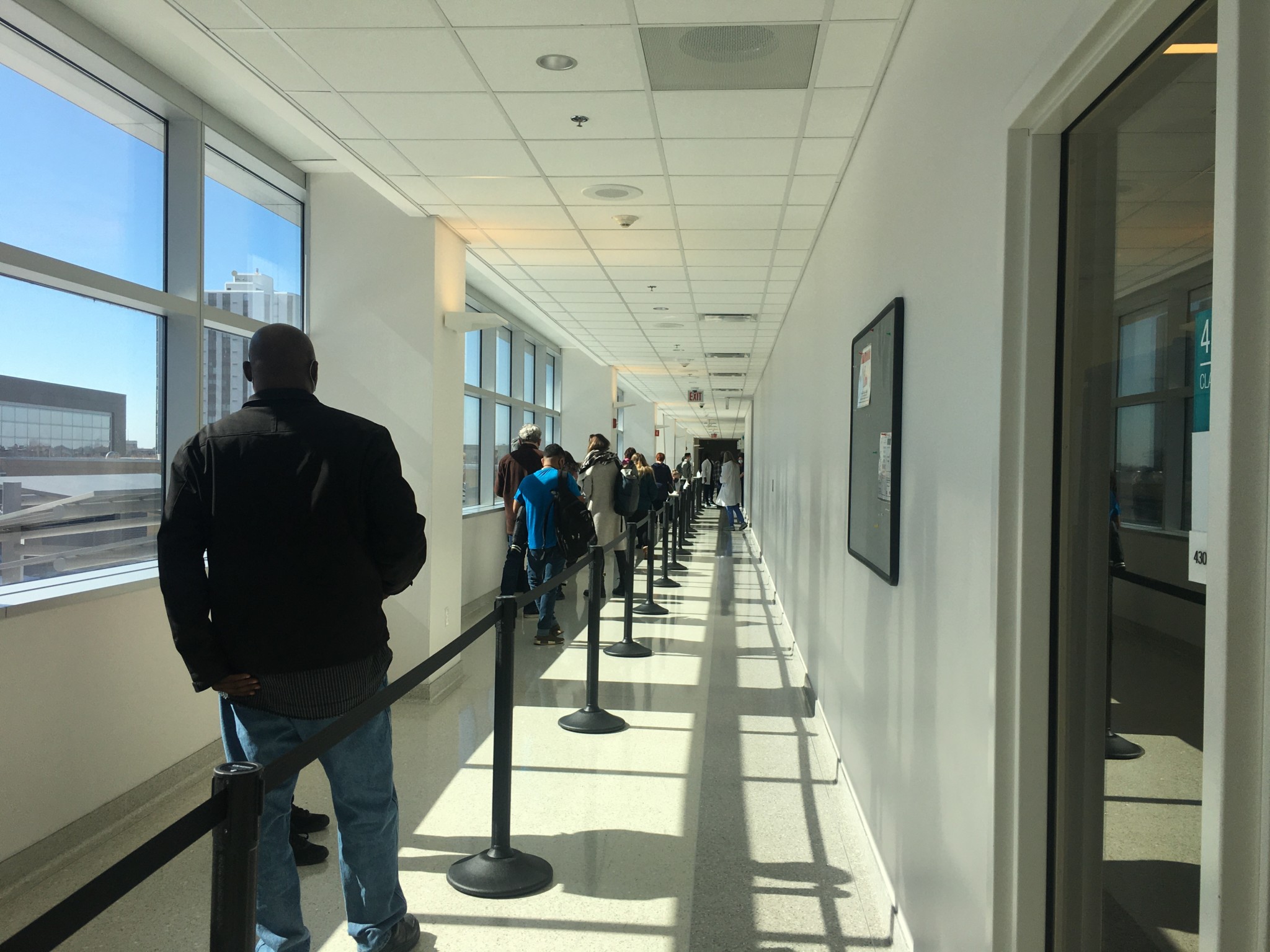When I arrived at Malcolm X College, the City Colleges of Chicago’s media relations director, Veronica Resa, let me in and a security guard instructed me to fill out the COVID questionnaire. I passed through the security turnstile and explained to different people that I wasn’t there to get the shot, but that I was with the media, reporting. About a dozen people waited for the elevator. Along with others, I took the stairs, as the wait for an elevator was long. They were all going to the fourth floor, where more than a dozen people waited in a hallway to enter the vaccination room.
The city is expecting Chicagoans to stay up to date on vaccine availability at the City Colleges mass vaccination sites, or “Points of Distribution” (PODs)—Daley, Arturo Velasquez Institute, Kennedy-King, Olive-Harvey, Truman, and Malcolm X—by checking the Vaccine Finder website. As of press time, appointments at all PODs are completely booked.
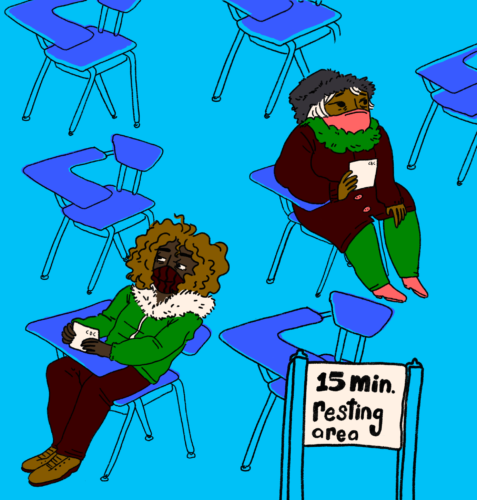
In late January, the Chicago Department of Public Health (CDPH) began recruiting and training staff from various city departments and sister agencies to become volunteers, including City Colleges faculty and staff during their regular working hours. Their tasks, which require no special medical licensing, include providing directions to the public, serving as social distancing or line monitors, and supporting registration and check-in tables during the six-to-nine month vaccination campaign.
Inside a room normally used as a classroom, people sat on tables waiting for their turn. Student nurses and administrators stood around and talked amongst themselves. At that moment, one of the nursing students was administering a shot of the Pfizer vaccine in Thessolonians “Tess” Bradford’s right arm. I sat near her as she told me this was her second shot of the COVID-19 vaccine.
We sat in front of each other between plastic glass, our face masks on. “I feel a sense of hope and relief,” Bradford said. Even though I was not getting a shot, I too felt the thrill of anticipation.
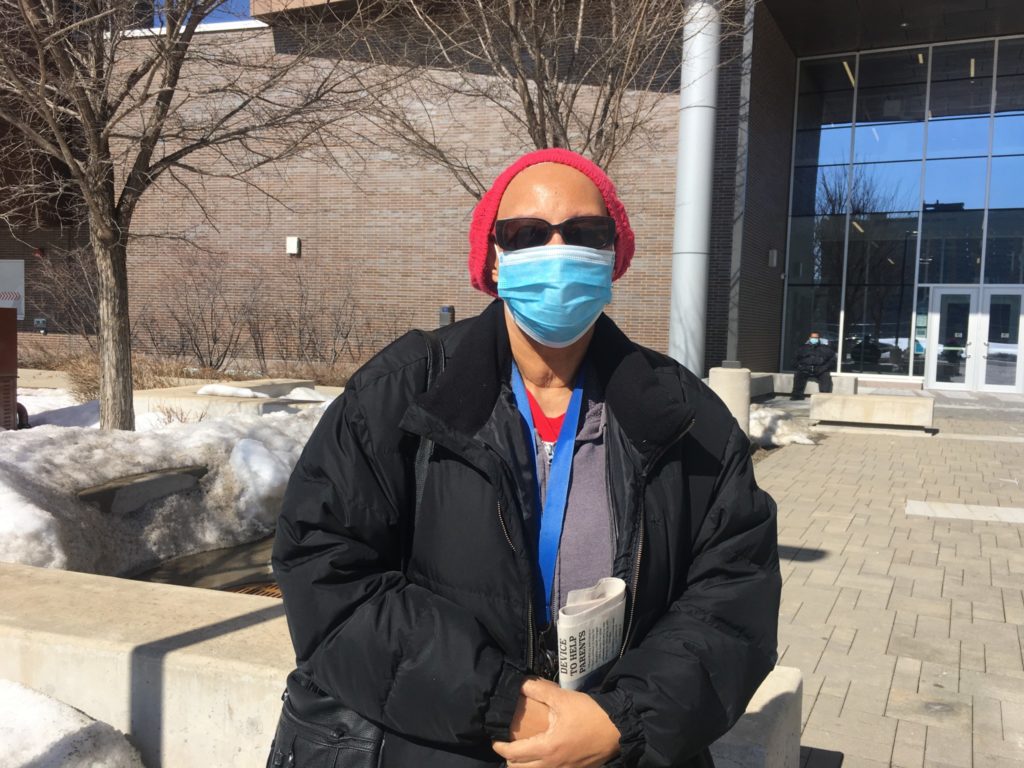
Bradford said her daughter, Khalilah, had woken up crying one night out of frustration because every time she called the COVID-19 infoline, she’d get cut off or put on hold. Bradford said she had also called the hotline herself and had the same problem. After going through that a few more times, she said she gave up.
“I threw away the number. [Had] you had more phone lines, or specific places [to go to]—but calling one central place?” she asked rhetorically. This was mid-December of 2020.
Bradford, who’s seventy, says she doesn’t like using Facebook, but in this case it helped. Her daughter posted asking where her mother could get vaccinated. The post led her mother to Loretto Hospital, which has been rolling out vaccine distribution at various community centers and colleges, including Malcolm X, one of the city’s mass vaccination sites.
A few months later, Khalilah drove her mother, who lives in Richton Park about forty miles north of Malcolm X, to get her first dose of the COVID-19 vaccine. But her daughter doesn’t recall where exactly she signed up. “This was in the midst of the madness and confusion,” said Bradford.
Andrew Buchanan, director of public affairs at the CDPH said those appointments were by “invite only.” Later the CDHP’s media team said that currently those eligible for a vaccine at city PODs are Phase 1a healthcare workers and residents eligible in Phase 1b. Vaccinations at these PODs are by appointment only, and can be scheduled via an invitation sent from an employer.
At the beginning of February, the city announced a partnership with the online portal ZocDoc which provides additional real-time appointment availability from select POD sites, which include the City Colleges as well as from local care organizations such as AMITA Health, Erie Family Health, Innovative Express Care, and Rush University Medical Center.
Earlier that day, a driver had transported those Pfizer doses to Malcolm X from a city-run site. While in the vehicle, the vaccines were kept inside Green Box technology, according to Erica Duncan, a spokesperson from CDPH. Green Box technology is designed to hold vaccines at a very tight range of temperatures. The boxes are constantly data-logged and GPS-tracked, and are able to maintain a fixed temperature for up to seventy-two hours.
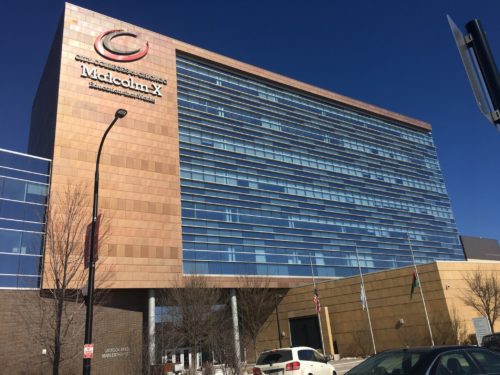
According to David Sanders, the president of Malcolm X, between 300 and 350 vaccines are administered every Friday, the day the center is open for people who qualify for vaccines in Phase 1a (healthcare personnel) and Phase 1b (persons aged sixty-five years and older, and frontline essential workers outside of the healthcare field). He says no vaccines have gone to waste since they started the program on December 28, 2020.
But Bradford, a retired CPS teacher, said she had some initial concerns about the vaccine. “Is this the real deal?” she asked. “Are we gonna get the same thing that white people get?”
“It’s always worse for us,” she said, adding that this lack of trust stems from centuries of racism and brutality against Black people: “We didn’t volunteer to come here, we were forced to work, we were forced to breed children, we were not allowed to get an education, and never allowed to use our own language. And when Black people were dying, in such great numbers….”
But she said that after her doctor got the shot, she went ahead and did it too. “He seemed okay. I put together all the information that I could and said, I want to live, and right now, this is it.”
Despite the frustration she experienced searching for a place to get her vaccine, overall, Bradford was happy with the way things worked out at Malcolm X. She said even the president was helpful. “He was checking up on people. Everyone there I saw did a great job.”
For his part, Sanders was particularly worried about Malcom X’s nursing students, who have had problems getting clinical seats at various hospitals in the city. Clinicals are part of a student’s nursing training that gives them hands-on experience in different specialty areas.
In order to accept the students, Sanders said, hospitals wanted to make sure that nursing students had been vaccinated. “They were saying ‘we are all vaccinated, and you are not,’” he said. So, Malcolm X allowed nursing students, not previously eligible, to also get the vaccine as part of Phase 1a. “We are a community college. We’ve recognized that we have to hit it on both sides of the equation.”
Bukky Fajinmi, forty-four, is one of these nursing students. It was difficult to talk with her because she was running around every time I approached her, but we were able to speak for five minutes. She is in her second semester doing her clinical hours as a volunteer vaccine administrator at Malcolm X. She said she feels good about it. “The sooner we go about doing this, the sooner we will get back to normal.”
Fajinmi said that every Friday for four weeks, since Malcom X opened its doors as a mass vaccination site, she has administered thirty to thirty-five shots herself. She said her volunteer work is longer than her clinicals. Normally she’d be finished by noon, but it was around 12:30pm when I pulled her for a quick interview. At times, she said, the nursing students are there until 3:00pm. Fajinmi said this has helped her in getting to know the community better. “As a nursing student, there is always that first time you have to speak with a patient, so doing it every week has made it easier.”
Dr. Daniel Okhilua, who students refer to as “Dr. O,” teaches “The Fundamentals of Nursing” at Malcolm X, which is the very first class nursing students have to take. He also helps facilitate students’ clinical hours there. When nursing students come to the classroom in the morning, Okhilua gives them an orientation, and briefs them on the do’s and don’ts of the vaccine program. He also helps with crowd control and instructs nursing students on how to administer the vaccines, something he said students already have learned by reading, watching videos, and practicing on mannequins. “I am here to make sure everything is done right,” he said.
Okhilua also facilitates the required fifteen-minute observation period for people who have received the shot, where he watches patients for adverse effects. According to Okhilua, no one has had any problems.
There is also a follow-up process, he explained. People who have gotten their shot receive weekly text messages with questions about any adverse effects that may arise. Okhilua likes the idea of his students doing the clinicals at Malcolm X and being able to get practical knowledge. “Clinicals consist of reading, practice, then putting that into action. And practice is what builds confidence.”
The city has stated during press conferences and communications that people who are eligible can make appointments by visiting the CDPH website. According to the website, those eligible could find appointments through their healthcare provider, a pharmacy or employer. But back in December, when Bradford was looking for appointments,there was no citywide registry to sign up to get the vaccine.
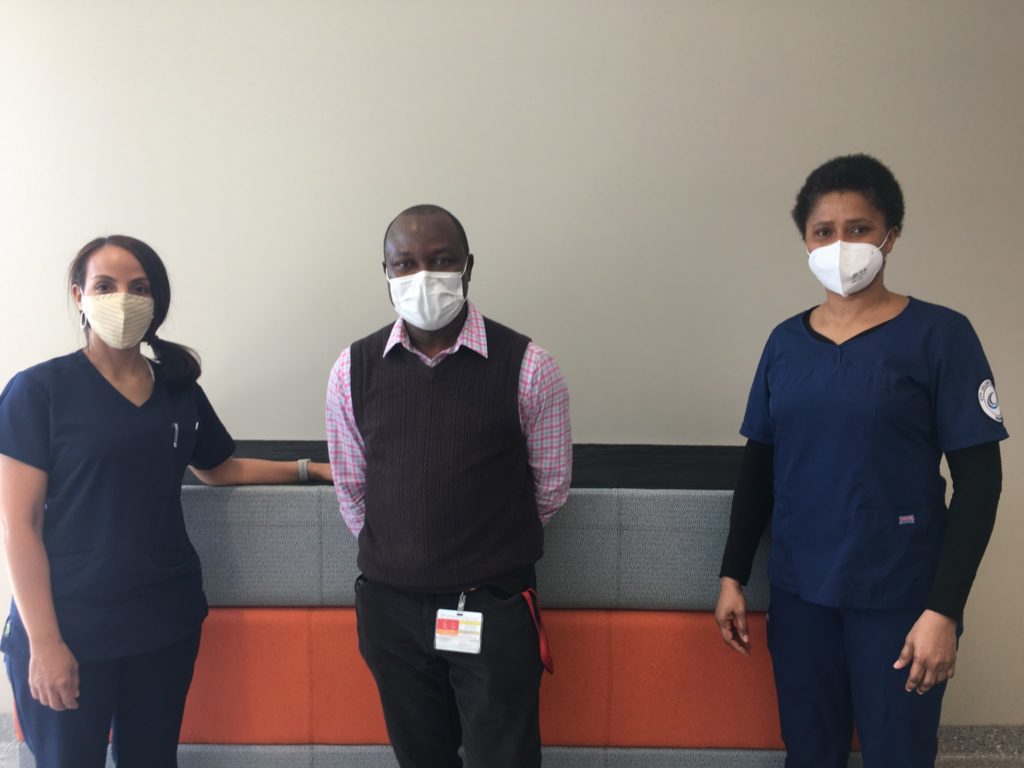
Thanks to her daughter, Bradford has been able to get her vaccinations. But she thinks mass vaccination sites—particularly the site at the United Center, which opened Tuesday, March 8—may be challenging for older adults to access. “Most people who are sixty-five and older need help getting around.” She thinks sites such as drugstores and park districts would have been better when the city initially was rolling out the vaccine. “Whoever was in charge, probably thought, let’s just get a big area, because we have lots of people,” she speculated. “It would have been better if you started smaller.”
Those appointments are currently available for people in nine ZIP Codes that have been hardest hit by the virus, and are predominantly in Black and brown communities: 60649, 60608, 60652, 60620, 60619, 60624, 60644, 60651, and 60653. The site remains open for Illinois seniors, as well as Chicago residents who qualify under Phase 1b. According to the city, appointments can be made at the COVID-19 Help Line at (312) 746-4835. An online registration platform and voucher code is being shared with people in eligible communities. Additionally, on February 25, Illinois entered into Phase 1b-plus, expanding vaccine eligibility to include people with certain underlying health conditions.
After finishing her clinicals at Malcolm X, Fajinmi, the nursing student, traveled twelve miles north to Norwood Life Society, where she cares for older adults as a certified nurse assistant. Bradford and Khalilah left for Richton Park. More people entered the building, signed in at the security table, answered the COVID-19 questionnaire, sanitized their hands, and headed to the fourth floor. Roughly 300 people got a Pfizer vaccine that Friday. Later that same morning, the Illinois Department of Public Health announced 2,441 new cases of COVID-19 and fifty-five deaths in Illinois.

